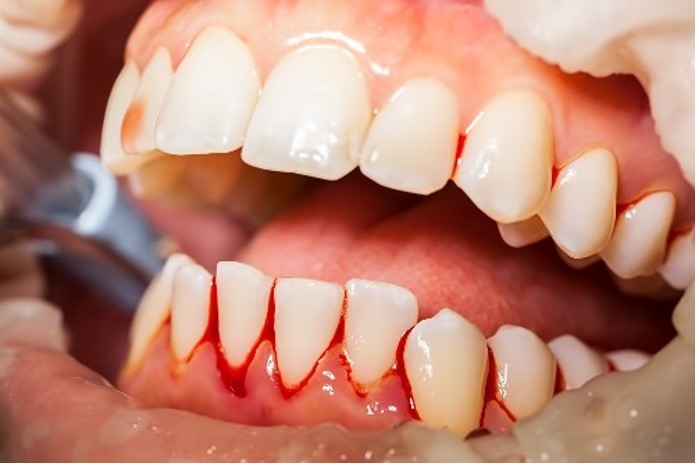Many patients say their gums have been bleeding for many years. Since they felt no pain, they thought it was normal. Well, bleeding gums are not normal for any reason.
In this column, we will discuss the meaning of bleeding gums mean and how to eliminate this condition.
Reports from patients confirm their gums bleed under the following conditions:
- During regular brushing and they spit into the sink or seen on tooth brush
- When using a toothpick or while flossing
- When they bite into a sandwich or an apple
- Blood found on pillow after sleeping
If you’ve noticed some blood after brushing or flossing your teeth, or any of the above reasons there is cause for concern. Do you bleed through your nose, eyes or ears? Well, you shouldn’t bleed in your mouth either.
Here are the most common scientific causes for bleeding gums:
- Gingivitis
- Periodontal disease (mild, moderate or advanced)
- Changes in dental hygiene routine
- Medications
- Brushing or flossing too aggressively
- Pregnancy gingivitis
Gingivitis and Periodontal disease- cause swollen, tender and bleeding gums during brushing. Gingivitis is the first stage of periodontal disease, also known as gum disease. When plaque on your teeth and at the gumline is not removed by brushing properly and flossing it can infect the gums. The good news is that gingivitis is reversible with treatment with your dental hygienist and dentist.
The main cause of gingivitis is improper oral hygiene. If not addressed, gingivitis can progress to periodontal disease. The good news is you can prevent this outcome by seeking treatment as soon as there are early signs.
Changes in dental hygiene routine- If you have not flossed regularly or brushed properly, your gums might start to bleed when you begin to floss. For example, you should always brush your teeth prior to going to sleep and especially after eating. If this is stopped then, bleeding gums are likely. Returning to good hygiene habits sometimes eliminate bleeding gums. If it doesn’t, then contact your dentist to set-up an appointment because this may be a sign of gingivitis.
Using a “hard” or “medium”-bristle toothbrush may result in bleeding gums. Switch to a soft brush and talk to your dental hygienist about what toothbrush is right for you at your next appointment.
Medications are possible causes of bleeding gums. Blood-thinning medications decrease the blood’s ability to clot, which can lead to bleeding. Let your dentist and physician know about your experience and the medicines you’re taking during your regular appointments. If the bleeding becomes more serious, contact your physician immediately.
You may notice some bleeding if you floss or brush too aggressively. But don’t give up the practice — both flossing and brushing are critical for oral health. Ensure you use a soft-bristled toothbrush and use a gentler touch.
Pregnant women may experience swollen gums and bleeding during brushing. Pregnancy gingivitis is a term used to describe a gum condition during pregnancy. The hormone changes can alter the body’s response to the bacteria that cause gum disease, resulting in inflammation. Going to your dentist and dental hygiene appointments, regular brushing, and daily flossing can help to prevent gum inflammation and bleeding from becoming worse.
You can correct bleeding gums with proper oral hygiene using a soft-bristled brush and gentle flossing technique.
A critical concern for bleeding gums associated with gingivitis and periodontitis is the effect of the inflammation on the rest of the body. Locally, gum disease can cause halitosis (bad breath). Also, bleeding gums can cause teeth to get shaky and eventually fall out. As a result, it can create problems with chewing and speaking. In the rest of the body; gum disease can contribute to the development or aggravation of serious diseases such as diabetes, cardiovascular disease, chronic kidney disease, rheumatoid arthritis, Alzheimer’s and even some types of cancer. This is because the bacteria under the gums can pass into the bloodstream and cause systemic inflammation. Secondly, they can also migrate to other parts of the body.
The best prevention or treatment for bleeding gums is to maintain good oral hygiene. This means correct brushing, flossing and regular dental visits.
Bleeding gums are abnormal. It’s a note-worthy sign that something is wrong. Maintain good oral health by enjoying good habits thereby promoting good health and wellness.
Dr. Kendal V. O. Major is Founder and CEO of Center for Specialized Dentistry which is a comprehensive family dental practice operating in Nassau and Freeport. He is the first Bahamian Specialist in gum diseases and dental implants since 1989. He also is a certified Fast braces provider. His practice is located at 89 Collins Avenue, Nassau at (242)325-5165 or kmajor@csddentistry.com

Severe bleeding gums and gum swelling caused by plaque under the gums

Flossing is the is critically necessary to clean in between the teeth





